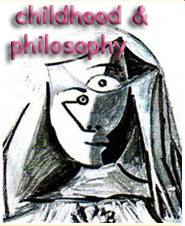existing in the world: but whose world—and why not change it?
DOI :
https://doi.org/10.12957/childphilo.2017.29923Mots-clés :
philosophy with children, gert biestaRésumé
This article takes issue with Gert Biesta’s lecture and my interpretation that his argument brings to the conclusion that the world is essentialist in nature. Thus, in this text, I will argue that existence “in the world” necessarily demanding the belief that many other worlds consisting of diverse identities and communities have long been present. It also counters the view that children must be taught to adjust to life in the world—i.e., submit and compromise—by promoting philosophical communities of inquiry that place children’s doubts and uncertainties at the centre of their focus, thereby promoting Tikkun Olam (social justice or the establishment of godly qualities throughout the world) in its broadest sense.




